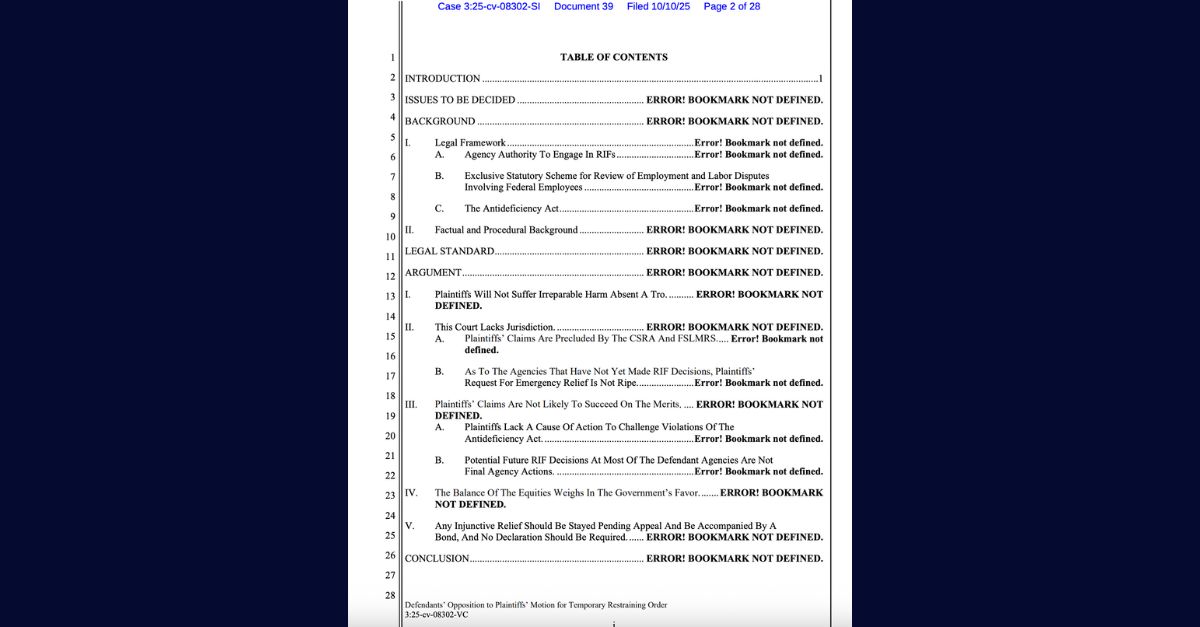Share this @internewscast.com
President Donald Trump speaks before Steve Witkoff is sworn in as a special envoy during a ceremony in the Oval Office of the White House, Tuesday, May 6, 2025, in Washington, with a portrait of former President Ronald Reagan in the background (AP Photo/Mark Schiefelbein).
The Trump administration submitted a motion riddled with errors in federal court on Friday, concerning the potential long-term dismissal of federal employees amid the ongoing government shutdown.
On Sept. 30, this litigation was initiated by two labor unions, reacting to an Office of Management and Budget (OMB) memo that framed the shutdown as a “chance” for federal agencies to downsize through reductions in force (RIFs).
The plaintiffs, in their 31-page complaint, sought injunctive relief under the Administrative Procedure Act (APA), which regulates agency actions. Last weekend, the labor unions submitted a 29-page motion requesting a temporary restraining order.
“In defiance of binding authority, even before the shutdown started, the Administration announced its intentions to conduct mass permanent terminations of federal workers—not merely temporary furloughs—during the shutdown,” states the second filing, aiming for an expedient resolution. “Now, those threats have materialized into actions that will soon be executed.”
Subsequently, the government filed a 28-page argument in opposition to the motion for a temporary restraining order – yet it seems some of the work suffered from a lack of thoroughness.
On at least 19 occasions, the document is pockmarked with various iterations of the phrase: “Error! Bookmark not defined.” In many instances, the phrase is rendered in all caps.
The error message is native to Microsoft Word and means a user has updated a field with a broken link to a bookmark. Or, in other words, a change was made attempting to point to a link that no longer exists.

A Trump administration filing with several Microsoft Word errors (U.S. Department of Justice).
The U.S. Department of Justice later filed a 3-page errata – a formal document admitting to, and correcting, certain mistakes.
“Defendants respectfully submit this errata to their Memorandum in Opposition to Plaintiffs” Motion for Temporary Restraining Order,” the mea culpa reads. “In finalizing their Opposition, Defendants inadvertently encountered errors in the Table of Contents required by Local Rules, including a technical error preventing proper display of the page numbers. Defendants apologize for the error, and respectfully submit the accompanying correction to their Memorandum in Opposition to Plaintiffs’ Motion for Temporary Restraining Order. The attached Memorandum is corrected only as to the Table of Contents. No changes have been made in the substance of Defendants’ Opposition.”
In terms of substance, the Trump administration insists the plaintiffs are simply overstating their case in terms of what the OMB memo – and accompanying guidance issued by the Office of Personnel Management (OPM) – actually mean for agencies writ large.
The OMB memo itself reads, in relevant part:
[A]gencies are directed to use this opportunity to consider Reduction in Force (RIF) notices for all employees in programs, projects, or activities (PPAs) that satisfy all three of the following conditions: (1) discretionary funding lapses on October 1, 2025; (2) another source of funding…is not currently available; and (3) the PPA is not consistent with the President’s priorities.
“The OMB memorandum takes the legally unsupportable position that a temporary interruption of appropriations eliminates the statutory requirement for all unfunded government programs and directs all federal agencies to ‘use this opportunity’ to consider reductions in force for any programs for which the funding has lapsed and that are not priorities of the President,” the unions argue in the original petition.
The motion for the temporary restraining order says OPM has taken strides to effectuate the “opportunity” in the OMB memo.
“In order for RIF notices to be sent across multiple agencies imminently, a substantial amount of work has been done and is being done by agency staff to prepare notices consistent with the elaborate and involved processes needed to issue such notices described above, consistent with OPM Guidance that staff should do this work during the shutdown,” the motion reads.
The government, however, insists the plaintiffs have simply misread the memo and the related activities undertaken since then.
“[T]hese documents are not binding because individual agencies—not OMB or OPM—are the entities that would conduct any RIFs,” the opposition motion argues. “They are also the entities that would make any final decision whether to do so.”
Late Friday, U.S. District Judge Susan Illston, a Bill Clinton appointee, set a hearing on the restraining order motion for Oct. 15.

















